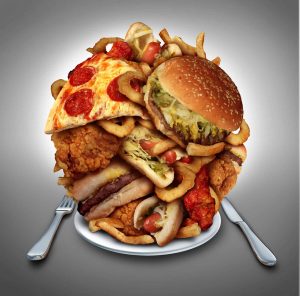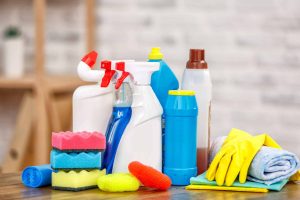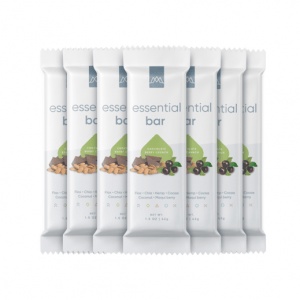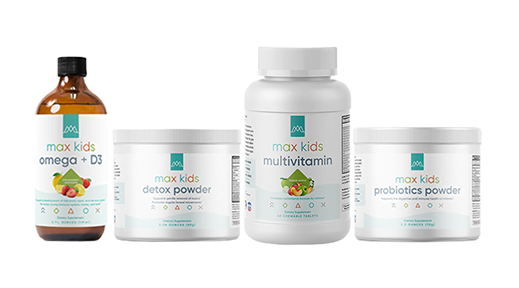- Teens Don’t Always Make the Healthiest Food Choices
- Deficiencies Can Impair Puberty
- Factors That Can Impact Puberty
- Start with Your Fork: Good Nutrition During Puberty
- 6 More Ways to Stay Healthy During Puberty
Puberty is the age or period where a boy or girl matures and becomes capable of reproducing. Their reproductive organs develop. Boys grow facial hair. Girls develop breasts.1
For girls, these and other changes occur between ages 10 and 14. For boys, that process happens between 12 and 16.2
As children move into their teen years, dramatic physical changes occur. They gain about 20 percent of their final adult height, for one. Puberty also means they put on about half of their adult weight. Bone remodeling occurs, and bone mass increases by 45 percent. Many organs increase in size.3
 That might explain why your adolescent suddenly raids the fridge more often: These and other changes can increase appetite. On average, teens eat more.4
That might explain why your adolescent suddenly raids the fridge more often: These and other changes can increase appetite. On average, teens eat more.4
Ideally, your teens will get those nutrients from the foods in our Core Plan. That includes plenty of protein and nutrients like zinc, which teens need to develop and grow.5
Even with the healthiest diet, teens may not get the right amount of vitamins and minerals they need to thrive. Nutrient deficiencies — not getting enough calories, protein, vitamins, minerals, and more — can impair growth and development during puberty.6
Organizations including the Linus Pauling Institute recommend that teens take a daily multivitamin/mineral supplement with the correct amount of vitamins and essential minerals.7
Our Max Kids Bundle makes getting those nutrients simple. This convenient bundle combines vitamins and minerals along with the other nutrients teens require to be their best during puberty.
Along with the right foods and lifestyle strategies, our bundle creates a solid nutrient foundation that allows your teen to thrive through puberty and beyond.
Teens Don’t Always Make the Healthiest Food Choices
Getting optimal nutrients becomes critical during puberty when teens need specific vitamins, minerals, and other nutrients.
 Unfortunately, many teens don’t make smart food choices. Convenience plays a part here. So does peer pressure, which can influence what foods teens choose.8
Unfortunately, many teens don’t make smart food choices. Convenience plays a part here. So does peer pressure, which can influence what foods teens choose.8
Fast food, processed foods, and sugar-sweetened beverages play a big part in the diets for many teens.9
Compared with earlier times, girls today begin puberty at an earlier age. Researchers speculate that processed foods might contribute to this early development.10
Other research shows that:
- Less than two percent of adolescents eat the right amounts of all food groups.
- About 20 percent of females and seven percent of males don’t eat an adequate number of portions from any food group.
- Most teens eat too many fatty foods and too few vegetables and fruits.
- What’s the number one “vegetable” most teens eat? French fries.11
Poor food choices contribute to nutrient deficiencies, which can increase the risk of obesity and chronic disease during puberty and adulthood.12
Deficiencies Can Impair Puberty
Good nutrition starts when your child is born. Getting the right nutrients during infancy, childhood, and around puberty can significantly impact growth and development.13 It’s never too late to address these nutrient deficiencies to help your teen thrive.
Consider magnesium, a mineral that plays a role in over 300 essential metabolic reactions. Many teens don’t get enough magnesium.14
Vitamin D deficiencies, on the other hand, contribute to chronic diseases including diabetes and obesity and impact puberty.15 Many teens have low levels of vitamin D.16 Other nutrients that they potentially lack include calcium, iron, and zinc.17
Getting the right nutrients requires eating the right foods in healthy amounts. Overweight or obese children are more likely to enter puberty early. Obesity might increase puberty early in girls and delay when puberty occurs in boys.18
Being obese can also create hormonal imbalances, including high insulin levels that can increase risk of diabetes.19
Undereating can also become a problem during puberty. Girls especially might feel pressured to diet or otherwise lose weight in an unhealthy way.20 Researchers find that females could eat about 25 percent fewer calories during middle and late adolescence than boys, creating potential nutrient deficiencies.21
Factors That Can Impact Puberty
Getting the right nutrients is critical during any period in life, and especially during puberty.
 The right foods and nutrients help teens grow and develop. So do smart lifestyle choices. These factors can impact the growth and development that teens have during this time:
The right foods and nutrients help teens grow and develop. So do smart lifestyle choices. These factors can impact the growth and development that teens have during this time:
- Environmental toxins. Every day, teens — like everyone else — are exposed to thousands of potentially harmful chemicals in food, drinking water, skincare products, and much more.22 They include:
- Phthalates, which are used in cosmetic products, shampoos, and other products.
- Bisphenol A (BPA), found in plastic and canned bottles. BPA can mimic the hormone estrogen, leading to early puberty.23
Over time, these and other chemicals can accumulate in the body and disrupt hormone balance. Among their damage, these endocrine disruptors can impair the normal course of puberty.24
- Poor sleep. While teens need about eight to 10 hours of sleep every night, most only get around 6.5 to 7.5 hours. The repercussions of sleep deprivation in teens include compromised mental wellbeing and academic performance.25
- Overusing technology. Many teens spend more time staring at laptops, phones, tablets, and other electronic devices than they do sleeping. In fact, the average teen spends an astounding nine hours every day staring at screens.26
- Chronic stress. As their bodies change, teens can experience more stress. Family issues, problems with friends, negative thinking, school demands, and taking on too many activities can create more stress. All of these stressors can lead to behaviors including anxiety, aggression, and withdrawing.27 They can also lead to poor eating choices.
The good news is that with the right diet and lifestyle strategies, you can address many of these factors to ensure your teen moves through puberty healthy and happy.
Start with Your Fork: Good Nutrition During Puberty
Before puberty — around age 10 in girls and 12 in boys — teens have an increase in appetite.
This paves the way for early adolescence when the human body needs more calories than any other time in life. That hunger spurt usually — but not always — stops when a child stops growing.28
During puberty, boys need about 2,800 calories a day. Girls need about 2,200 calories a day. Typically, the ravenous hunger starts to wane once a child has stopped growing, though not always. Bigger, taller, or more active teens will still need more calories into late adolescence.29
Getting those calories from the right foods becomes critical for good health during puberty and beyond. Our Core Plan contains sufficient amounts of protein and other nutrients to help your teen thrive.
 While you can’t control how your teen eats outside of the home, you have plenty of influence about what foods they choose:
While you can’t control how your teen eats outside of the home, you have plenty of influence about what foods they choose:
- Keep your kitchen well-stocked with healthy meals and snacks including fruits, vegetables, nuts, and seeds.
- Make healthy eating fun and convenient. Teens often make grab-and-go food choices. Convenience plays into what they eat.30 What you serve at meals and the foods you keep in your kitchen can significantly impact what your teens eat.
- Experiment with our MaxLiving recipes, including some delicious desserts!
- Keep healthy snacks like our Essential Bar nearby.
- Breakfast often gets low priority among busy teens. Make this important meal easy with a smoothie. Our Chocolate Smoothie is a hit with teens because it’s easy to make, tastes delicious, and keeps them full and focused for hours.
6 More Ways to Stay Healthy During Puberty
Helping teens create a healthy lifestyle means they are more likely to maintain those good habits into adulthood.31 Along with eating healthy, these six strategies can help your teen transition through puberty feeling healthy, happy, and confident.
 Encourage regular exercise. An hour of exercise a day can help teens keep healthy body weight.32 Consistent exercise can also reduce your teen’s risk of diabetes, heart disease, and more.33 Find something that your teen enjoys and can commit to. Dancing, gymnastics, roller skating, and jumping rope are all fun activities that increase movement.34
Encourage regular exercise. An hour of exercise a day can help teens keep healthy body weight.32 Consistent exercise can also reduce your teen’s risk of diabetes, heart disease, and more.33 Find something that your teen enjoys and can commit to. Dancing, gymnastics, roller skating, and jumping rope are all fun activities that increase movement.34- Reduce environmental toxins. The chemicals in many everyday products can impact puberty. You can’t eliminate them, but you can help your teens make better choices. The Environmental Working Group (EWG) has excellent guides on buying the best produce, skincare products, and household cleaners.
- Help them manage stress. Recognizing the signs of stress in your teen can allow you to help them better cope with that stress.35 You’re a role model for your teen. Displaying good choices — eating well, exercising, and finding ways to cope with stress — can make a big impact on your teen. So can healthier meals: Studies show that eating well helps your teen better manage stress levels.36
- Promote good sleep. Especially if your teen has bad sleep habits, creating a better routine takes time. But even 30 minutes of extra sleep can make a big difference. A sleep ritual means turning off electronics a few hours before bed. Instead, encourage your teen to unwind with a hot bath and maybe some gentle yoga.37
- Consult your chiropractor. When your spine is out of alignment, everything suffers. Teens are especially at risk for spinal misalignment. The shoes they wear, chairs they sit on in classes, and the way they stand: All of these things impact the spine and their overall health. Chiropractic can help your teen in many areas, including:
- Carrying heavy backpack loads
- Repetitive stress (like sitting for long periods without the right support)
- Traumatic events such as falling on the playground
- Sports injuries
- Restoring mobility to joints restricted by tissue injury caused by a traumatic event
- Specific aches and pains38
- You can search your city or postal code for an experienced chiropractor here.
- Give the right nutrients. Our Max Kids Bundle combines all the nutrients your teen needs to thrive in puberty and beyond. This exclusive bundle includes:
- Our naturally sweetened Max Kids Chewable Multivitamin provides children with a foundation for healthy growth and development.
- Max Kids Omega + D3, a strawberry lemonade flavored, liquid formula that combines fish oil and vitamin D.
- Max Kids Detox Powder supports a healthy digestive tract and liver.
- Max Kids Probiotics Powder increases the number of beneficial bacteria in the gut. This supports the breakdown of food, absorption of nutrients, and healthy elimination of toxins.
Empower your teen to make the right food and lifestyle choices. When they do all that, Max Kids Bundle creates a healthy foundation to help them move through puberty and beyond.
Remember that you’re a powerful role model for your teens. Creating healthy habits helps them move through puberty well. The habits they create during this period will carry into their adult life, helping create a foundation to feel good and reduce their risk of disease.39
References
- https://www.merriam-webster.com/dictionary/puberty
- https://medlineplus.gov/puberty.html
- https://pedsinreview.aappublications.org/content/21/1/32
- https://www.choc.org/programs-services/nutrition/adolescents-teens-nutrition/
- https://www.ncbi.nlm.nih.gov/pmc/articles/PMC4266867/
- https://pedsinreview.aappublications.org/content/21/1/32
- https://lpi.oregonstate.edu/mic/life-stages/adolescents
- https://www.choc.org/programs-services/nutrition/adolescents-teens-nutrition/
- https://lpi.oregonstate.edu/mic/life-stages/adolescents
- https://www.ncbi.nlm.nih.gov/pmc/articles/PMC4266867/
- https://pedsinreview.aappublications.org/content/21/1/32
- https://www.ncbi.nlm.nih.gov/books/NBK525242/
- https://www.ncbi.nlm.nih.gov/pmc/articles/PMC4266867/
- https://lpi.oregonstate.edu/mic/life-stages/adolescents
- https://www.ncbi.nlm.nih.gov/pmc/articles/PMC4114046/
- https://www.ncbi.nlm.nih.gov/pmc/articles/PMC4266875/
- https://www.healthychildren.org/English/ages-stages/teen/nutrition/Pages/A-Teenagers-Nutritional-Needs.aspx
- https://www.ncbi.nlm.nih.gov/pmc/articles/PMC4266867/
- https://www.ncbi.nlm.nih.gov/pmc/articles/PMC4266867/
- https://www.ncbi.nlm.nih.gov/books/NBK525242/
- https://www.healthychildren.org/English/ages-stages/teen/nutrition/Pages/A-Teenagers-Nutritional-Needs.aspx
- https://www.sciencealert.com/you-exposed-thousands-untested-chemicals-for-decades-scientists-warn-hazardous-toxic
- https://www.ncbi.nlm.nih.gov/pmc/articles/PMC4266867/
- https://www.ncbi.nlm.nih.gov/pmc/articles/PMC4266867/
- https://www.betterhealth.vic.gov.au/health/healthyliving/teenagers-and-sleep
- https://qz.com/1367506/pew-research-teens-worried-they-spend-too-much-time-on-phones/
- https://www.aacap.org/AACAP/Families_and_Youth/Facts_for_Families/FFF-Guide/Helping-Teenagers-With-Stress-066.aspx
- https://www.healthychildren.org/English/ages-stages/teen/nutrition/Pages/A-Teenagers-Nutritional-Needs.aspx
- https://www.healthychildren.org/English/ages-stages/teen/nutrition/Pages/A-Teenagers-Nutritional-Needs.aspx
- https://www.choc.org/programs-services/nutrition/adolescents-teens-nutrition/
- https://www.urmc.rochester.edu/encyclopedia/content.aspx?ContentTypeID=90&ContentID=P01602
- https://www.webmd.com/parenting/raising-fit-kids/move/get-teens-moving#1
- https://www.urmc.rochester.edu/encyclopedia/content.aspx?ContentTypeID=90&ContentID=P01602
- https://www.urmc.rochester.edu/encyclopedia/content.aspx?ContentTypeID=90&ContentID=P01602
- https://medlineplus.gov/ency/patientinstructions/000814.htm
- https://parentandteen.com/stress-management-teens-eat-well/
- https://www.betterhealth.vic.gov.au/health/healthyliving/teenagers-and-sleep
- https://www.webmd.com/pain-management/guide/chiropractic-pain-relief#1
- https://www.ncbi.nlm.nih.gov/books/NBK525242/



